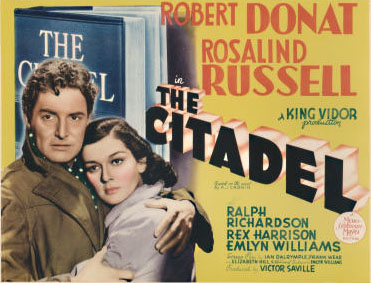Book Review: “The Citadel”

By Source, Fair use, https://en.wikipedia.org/w/index.php?curid=14275249
October 9, 2018
“The Citadel” by A.J. Cronin is a fiction novel published in 1937. Although an older book that’s only read for research papers, it is intriguing, immersing the reader into a doctor’s life and career in the interwar United Kingdom. The book presents an analysis of the issues facing British healthcare during the 1930s.
Cronin does this by delivering the story from the point of view of Dr. Andrew Manson, a character whose life and career are based on those of Cronin himself. The events, developments and thoughts of Manson are repeatedly utilized to condemn a disorganized and at times unethical healthcare situation present throughout his profession. Cronin’s usage of his own life and experiences in this work not only increases the power of his analyses and observations about healthcare and ethics but also the factor of story development and immersion.
The entirety of the story centers on the point of view of Manson. The story begins with his arriving in the Welsh mining town of Blaenelly as a new graduate from medical school. He is met by the initial antagonist, Mrs. Page, the wife of the doctor for whom Manson works for. She attempts to cement dominance over him, at first by feeding him scraps and later by demanding that he cut ties with her opposition and forward all payment, even his own gratuities, to her so that she can profit off him. This conflict culminates with his departure of Blaenelly for a new job in another Welsh mining town, Aberalaw. This section of the story is primarily describing general working conditions of doctors in Wales. The fact that this is based on the experiences of Cronin himself also adds a sense of legitimacy to the work.
As he leaves town, he marries the woman he’s been romantically involved with, a school teacher, after their initial conflict over giving medical care to one of her students. On the same day they were married, they made the move into their new home in Aberalaw. When he begins his new job, he makes yet another enemy out of a worker with ties to the Committee that oversees the medical care in Aberalaw. He sees through the unethical issuing of excuses to get this man off work. He gives the man a prompt result; he is completely healthy. However, in the long run, this man sought to destroy Manson’s career. The situation serves as a great summation of the institutional conflicts interest that plague Manson for the rest of the story.
These are only some of the conflicts. However, what makes these important is that they repeatedly show the unethical and corrupt behavior present throughout the healthcare system in the United Kingdom at the time. Cronin, through Manson, exhibits a will to care for and improve the lives of the population, declaring that it shouldn’t be about the money. In addition to his work caring for patients, he also does in-depth research into diseases of the lung, specifically the correlation between mining career and developing these diseases. However, he is constantly met with attempts to make a quick buck over doing his job, among other unethical practices that pacify his impatience with the system, which he partakes in. However, after a deteriorating relationship with his wife and her death, he seeks to restore his principles, culminating in his almost getting kicked of the medical register.
Overall, “The Citadel” is definitely an interesting book, especially if the history of medical care is one’s forte. However, even if history isn’t of your utmost interests, the elements of immersion and a dynamic plot with various antagonists and personal dilemmas really makes this a great work worth coming back to.








